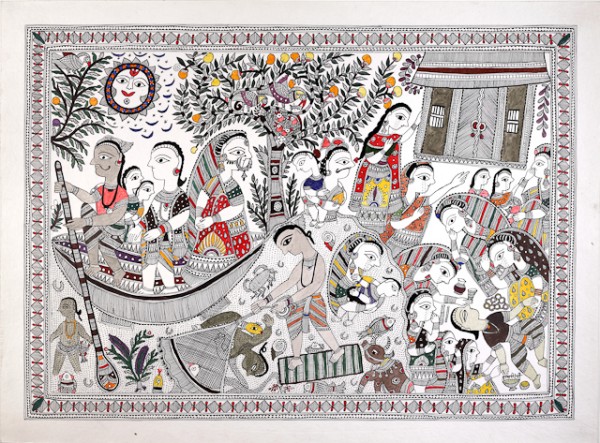Mithila Painting
Rani
Jha, director of the Institute, says Mithila art represents not only the
artists, but other women as well. "My paintings do not only concern the
position of women in Bihar, but in all of India. I show that in one of my
paintings, where I show a girl reaching up and wanting to touch the moon. In
education, in the corporate sector, and in athletics the rainbow of hope has
risen for these women and they see that with astonishment. Decade after decade
women are changing and remodeling themselves. Women who have been educated have
hope, but those two generations back are cursed and weep for their pathetic
plight.”
Mithila
painting is an ancient art form in the Likhiya,
literally meaning “writing,” style. The Mithila Art Institute, located in
Madhubani, India, gives uneducated and non-literate women across the entire
caste spectrum in India an incredible opportunity to use their talent and
create magnificent pieces. Using only ink as their tool, these women believe
they are writing, not painting, to express themselves.
 |
| Dulari Devi, The Great Flood of 2006: Photo Courtesy of Syracuse University Art Galleries |
The
paintings are not only an artistic tradition; they are empowering women in a historically
conservative society. While some paintings depict deities and ancient rituals,
others challenge gender relations. These women, who use their paintings as
their voice in society, comment on social norms and issues about which they
feel strongly.
 Since
2000, the students at the institute have been painting local, national, and
international events: floods, terrorism, global warming, and most recently,
feminist issues such as patriarchy, dowry, bride burning, female infanticide,
differential medical care and education for girls and boys, among others.
Since
2000, the students at the institute have been painting local, national, and
international events: floods, terrorism, global warming, and most recently,
feminist issues such as patriarchy, dowry, bride burning, female infanticide,
differential medical care and education for girls and boys, among others.
Rani
Jha captures women’s experiences in her paintings. “I can read a woman's
laughter and her smile and can tell whether it is real or fake. I worked in a
Short Stay Home (a government home for abused women) for a time, and I still
shudder with fear at what I saw and heard of the stories of these women. All
this I interpret and depict in my paintings,” she says.
Like Rani Jha, ProLiteracy also works to empower women in India. ProLiteracy partners with Yuvaparivartan in Tamil Nadu, to support the development of women living in squatter communities. Through the program, women have the opportunity take part in literacy education, income generation projects, and healthcare improvement campaigns. Yuvaparivartan trains local teachers and provides seed money for income-generating projects and advocacy resources.
Through another initiative, Laubach Literacy Education Trust (LLET) assists adult learners through village learning centers in the region of Kerala. Ninety percent of LLET learners are women whose families survive on seasonal, subsistence-level incomes from growing rice, fishing or unsophisticated construction. Most of the participants and their spouses are unemployed three-fourths of the year. For these people, literacy is a matter of survival. Many graduates of the village learning centers go on to enroll into the tuition-free LLET vocational school where they complete specialized course work and receive government certification in tailoring, typing, weaving, knitting, shorthand or accountancy. This combination of literacy and vocational training has become key for women to gain employment within the formal economy.
Click here to learn more about programs ProLiteracy supports in India and other parts of the world.

Comments
Post a Comment